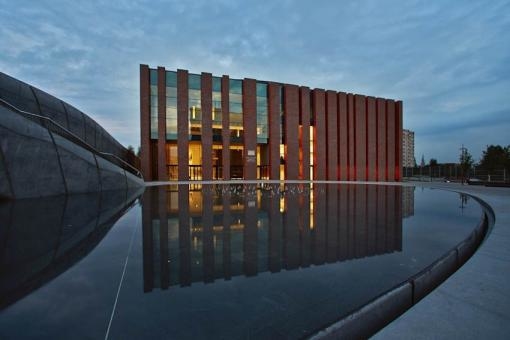The Brno – UNESCO City of Music team recently participated in the evaluation of the annual report for the to date four-year activities of two other member cities – Kingston (Jamaica) and Katowice (Poland). The city of Katowice, which has carried the title of UNESCO Creative City of Music since 2015, has managed to be inscribed on the cultural map of Europe.
Katowice has been part of the UNESCO network of creative cities since 2015, but for locals the city has another poetic title – a city of gardens. The city grew in the past thanks to the mining and steel industries; nowadays it invests in culture and creativity, with the motto "from heavy industry to creative industries". Katowice, with its 310,000 inhabitants, contributes € 45 million each year in grants to support the creative economy, mainly focusing on the renewal of the city's cultural spaces dedicated to music industries. Thanks to this, music of all possible genres resounds around the city throughout the year, from classical to rock, jazz, baroque, electronica, metal and rap.
Until now, the Katowice urban area has been possibly perceived as an industrial, greyish scrummage of houses and factories, or as a base for low-cost airlines and their flights to the world. There is no denying of the industrial past and actually also the present of this city, which, thanks to various historical extensions, does not have a unique style and a city centre as such. However, in recent years, the city has been transforming itself into a creative and attractive centre of southern Poland, which is worth visiting for music, architecture and industrial heritage.
Katowice is an important historical city in Upper Silesia in southern Poland, which lies on the Klodnica and Rawa rivers. It is the capital of the Silesian Voivodeship and the centre of the Upper Silesian Industrial Agglomeration (Górnośląski Okręg Przemysłowy), with a population of up to 2.1 million.
The local municipality has committed itself to further development of the cultural and creative industries as drivers of urban renewal and sustainability, in particular through its five-year Cultural Zone programme, which has so far been the largest investment in cultural infrastructure in Poland. The main success of this programme is the construction of a spectacular hall, which is home to the Polish National Radio Symphony Orchestra (NOSPR) and the Silesian Museum of Historical Mining Sites, located in a former mining shaft in the centre of the city. The NOSPR building was built on the site of a former coal mine in Katowice and is now part of the Cultural Zone, which provides a perfect example of revitalisation of post-industrial areas for cultural purposes. Just next to the NOSPR there stands, among other things, the icon of Katowice – the "Spodek" concert and sports hall. Its name (spodek) means "saucer" in Polish due to its resemblance to a flying saucer; it is the dominant orientation point in the landscape and a symbol of the city.
"Symfonie" – the concert hall of the Karol Szymanowski Academy of Music, is also a real musical and architectural gem on the Katowice cultural map. Since its opening in 2006, it has attracted audiences for a wide range of concerts, featuring prominent artists and orchestras, as well as talented young musicians, who are only at the beginning of their professional career. The Palace of Youth is a place designated for young people in Katowice. Young talented people can develop their skills and interests there, both in the musical field and many others. This leisure activity centre offers a wide range of activities in the fields of music, theatre, dance and sports.
Katowice is considered the centre of education in Upper Silesia. The local university, Uniwersytet Śląski, is celebrating the 50th anniversary of its founding this year. Katowice is also recognised throughout Poland as a centre of music education, and it has a long tradition of amateur choirs and orchestras. The Karol Szymanowski Academy has been operating in a beautiful neo-Gothic mansion since 1929, offering music education in a number of disciplines (conducting, composition, music theory, and jazz interpretation, instrumental and vocal interpretation). The school has recently built a hall, exceptional for its acoustics and architecture. Nowadays, the city is home to 30 music clubs, 7 music publishers, 12 recording studios, 11 music shops and 24 concert halls. Every year, 27 music festivals take place in Katowice. The largest of them are:
OFF Festival: an alternative festival of the city that won the European Prize for the Best Media Festival in 2011;
Rawa Blues: the largest indoor blues festival in the world. In 2012, it received the Keeping The Blues Alive award. Thanks to it, Katowice is the capital of Polish and European blues.
Tauron Nowa Muzyka: an urban festival of avant-garde, electronica, jazz and dance music; three-time winner of the European Festival Award for Best Small Festival;
The METALMANIA Festival was founded in 1986 and is the largest festival of its kind in our part of Europe.
The Katowice JazzArt Festival, Jazz Beyoned and Silesian Jazz Festival enjoy great popularity.
Lovers of classical music will certainly appreciate the Katowice Culture Nature Festival and the Modern Music First Performance Festival (a festival of contemporary music premiéres), which takes place at the NOSPR. The city also hosts three international competition festivals.













No comment added yet..